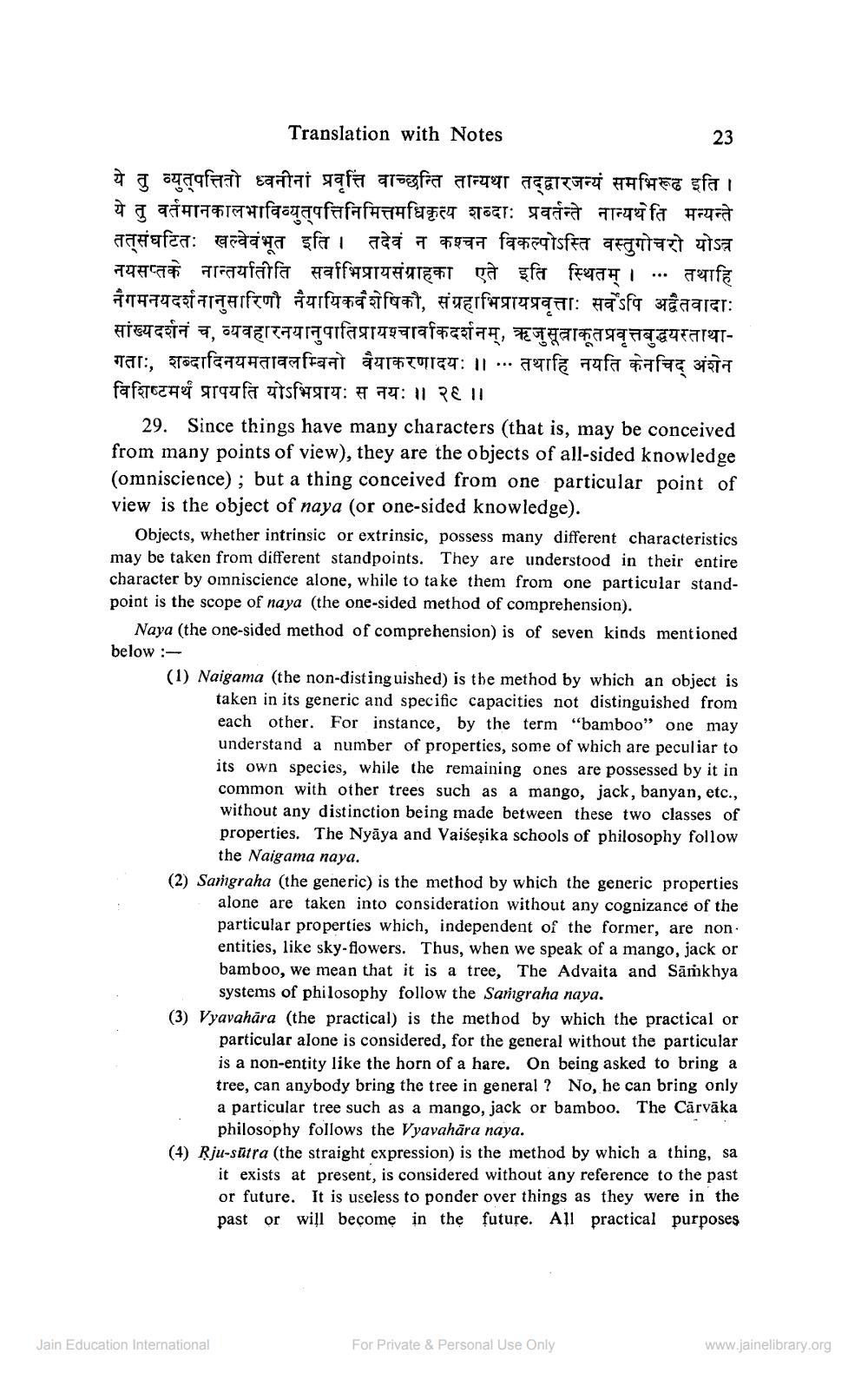________________
Translation with Notes
23
ये तु व्युत्पत्तितो ध्वनीनां प्रवृत्ति वाच्छन्ति तान्यथा तद्द्वारजन्यं समभिरूढ इति। ये तु वर्तमानकालभाविव्युत्पत्तिनिमित्तमधिकृत्य शब्दा: प्रवर्तन्ते नान्यथेति मन्यन्ते तत्संघटितः खल्वेवंभूत इति । तदेवं न कश्चन विकल्पोऽस्ति वस्तुगोचरो योऽत्र नयसप्तके नान्तर्यातीति सर्वाभिप्रायसंग्राहका एते इति स्थितम् । ... तथाहि नैगमनयदर्शनानुसारिणौ नैयायिकवैशेषिकौ, संग्रहाभिप्रायप्रवृत्ताः सर्वेऽपि अद्वैतवादाः सांख्यदर्शनं च, व्यवहारनयानुपातिप्रायश्चार्वाकदर्शनम्, ऋजुसूत्राकूतप्रवृत्तबुद्धयरताथा
Tar:, Toatfentharaffaat &TUTIGT: 11 - Jarfa pufa fafara TTA विशिष्टमर्थं प्रापयति योऽभिप्रायः स नयः ॥ २६ ।।
29. Since things have many characters (that is, may be conceived from many points of view), they are the objects of all-sided knowledge (omniscience); but a thing conceived from one particular point of view is the object of naya (or one-sided knowledge).
Objects, whether intrinsic or extrinsic, possess many different characteristics may be taken from different standpoints. They are understood in their entire character by omniscience alone, while to take them from one particular standpoint is the scope of naya (the one-sided method of comprehension).
Naya (the one-sided method of comprehension) is of seven kinds mentioned below : (1) Naigama (the non-distinguished) is the method by which an object is
taken in its generic and specific capacities not distinguished from each other. For instance, by the term “bamboo” one may understand a number of properties, some of which are peculiar to its own species, while the remaining ones are possessed by it in common with other trees such as a mango, jack, banyan, etc., without any distinction being made between these two classes of properties. The Nyāya and Vaiseșika schools of philosophy follow
the Naigama naya. (2) Sangraha (the generic) is the method by which the generic properties
alone are taken into consideration without any cognizance of the particular properties which, independent of the former, are non entities, like sky-flowers. Thus, when we speak of a mango, jack or bamboo, we mean that it is a tree, The Advaita and Sāmkhya
systems of philosophy follow the Sangraha naya. (3) Vyavahära (the practical) is the method by which the practical or
particular alone is considered, for the general without the particular is a non-entity like the horn of a hare. On being asked to bring a tree, can anybody bring the tree in general ? No, he can bring only a particular tree such as a mango, jack or bamboo. The Cārvāka
philosophy follows the Vyavahāra naya. (4) Řju-sütra (the straight expression) is the method by which a thing, sa
it exists at present, is considered without any reference to the past or future. It is useless to ponder over things as they were in the pastor wiļl become in the future. All practical purposes
Jain Education International
For Private & Personal Use Only
www.jainelibrary.org




